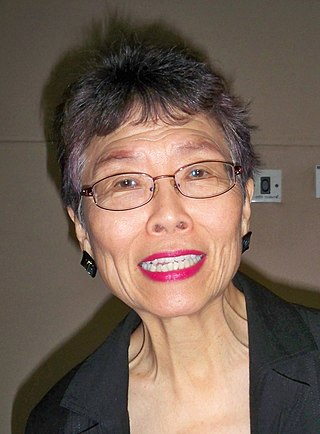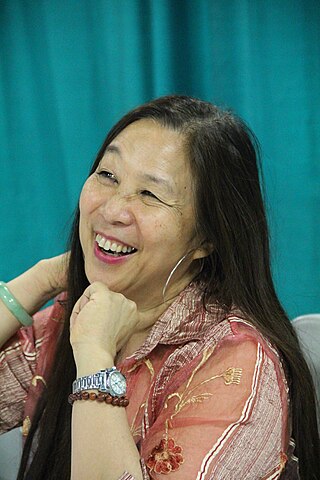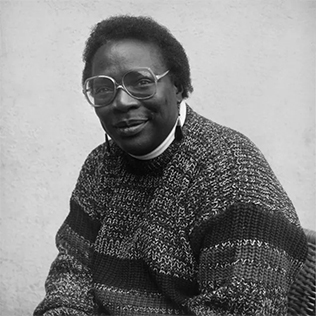Related Research Articles

Cherríe Moraga is an influential Chicana feminist writer, activist, poet, essayist, and playwright. A prominent figure in Chicana literature and feminist theory, Moraga's work explores the intersections of gender, sexuality, race, and class, with particular emphasis on the experiences of Chicana and Indigenous women. She currently serves as Distinguished Professor in the Department of English at the University of California, Santa Barbara.

Shirley Geok-lin Lim is an American writer of poetry, fiction, and criticism. She was both the first woman and the first Asian person to be awarded Commonwealth Poetry Prize for her first poetry collection, Crossing The Peninsula, which she published in 1980. In 1997, she received the American Book Award for her memoir, Among the White Moon Faces.
Mitsuye Yamada is a Japanese American poet, essayist, and feminist and human rights activist. She is one of the first and most vocal Asian American women writers to write about the wartime incarceration of Japanese Americans.

Jewelle Lydia Gomez is an American author, poet, critic and playwright. She lived in New York City for 22 years, working in public television, theater, as well as philanthropy, before relocating to the West Coast. Her writing—fiction, poetry, essays and cultural criticism—has appeared in a wide variety of outlets, both feminist and mainstream. Her work centers on women's experiences, particularly those of LGBTQ women of color. She has been interviewed for several documentaries focused on LGBT rights and culture.

Elana Dykewomon was an American lesbian activist, author, editor, and teacher. She was a recipient of the Lambda Literary Award for Lesbian Fiction.

Marilyn Chin (陈美玲) is a prominent Chinese American poet, writer, activist, and feminist, as well as an editor and Professor of English. She is well-represented in major canonical anthologies and textbooks and her work is taught all over the world. Marilyn Chin's work is a frequent subject of academic research and literary criticism. Marilyn Chin has read her poetry at the Library of Congress.

Lorna Dee Cervantes is an American poet and activist, who is considered one of the greatest figures in Chicano poetry. She has been described by Alurista as "probably the best Chicana poet active today."

Pat Parker was an African American poet and activist. Both her poetry and her activism drew from her experiences as a Black lesbian feminist. Her poetry spoke about her tough childhood growing up in poverty, dealing with sexual assault, and the murder of a sister. At eighteen, Parker was in an abusive relationship and had a miscarriage after being pushed down a flight of stairs. After two divorces, she came out as a lesbian, "embracing her sexuality" and said she was liberated and "knew no limits when it came to expressing the innermost parts of herself".
Alta Gerrey was a British-American poet, prose writer, and publisher, best known as the founder of the feminist press Shameless Hussy Press and editor of the Shameless Hussy Review. Her 1980 collection The Shameless Hussy won the American Book Award in 1981. She is featured in the feminist history film She's Beautiful When She's Angry.

Genevieve (Genny) Lim is an American poet, playwright, and performer. She is currently serving as the ninth poet laureate of San Francisco, California, and she is the first Chinese American poet to serve in this role. She served as the Chair of Community Arts and Education Committee, and as Chair of the Advisory Board for the San Francisco Writers Corps. She has performed with Max Roach, Herbie Lewis, Francis Wong, and Jon Jang among others in San Francisco, San Jose, San Diego, Houston and Chicago.

Janice Mirikitani was an American poet and activist who resided in the San Francisco Bay Area for most of her adult life. She managed the Glide Memorial Church with her husband, Cecil Williams. She was noted for serving as San Francisco's poet laureate from 2000 until 2002.
When I Was Growing Up is an autobiographical poem written by revolutionary feminist activist, Nellie Wong in 1973, describing her struggle to identify as an Asian-American girl growing up in the United States. Wong reflects on the universal representations of Western ideals of beauty advertised in American popular culture; from which, Wong expresses her desire to be white, to be normal. She states "...to become/a woman, a desirable woman, I began to wear/imaginary pale skin." The lack of and negative stereotypical representations of Asian-American women in Western popular culture denied Nellie Wong the agency to privilege her intersectional identity. The result of this patriarchal tool made Wong shameful of her Chinese heritage: "when I was growing up, I felt/dirty. I thought that god/made white people clean/and no matter how much I bathed/I could not change, I could not shed/my skin in the gray water."

Kim Shuck is a Cherokee Nation poet, author, weaver, and bead work artist who draws from Southeastern Native American culture and tradition as well as contemporary urban Indian life. She was born in San Francisco, California and belongs to the northern California Cherokee diaspora. She is an enrolled citizen of the Cherokee Nation of Oklahoma and also has Sac and Fox and Polish ancestry. She earned a B.A. in art (1994), and M.F.A. in Textiles (1998) from San Francisco State University. Her basket weaving work is influenced by her grandmother Etta Mae Rowe and the long history of California Native American basket making.
Merle Woo is an American academic, poet and activist who has been described as "a leading member of the Radical Women and the Freedom Socialist Party". Her essay "Letter to Ma" was selected for inclusion in the 1981 feminist anthology This Bridge Called My Back.

Susan Sherman is an American author, poet, playwright, and a founder of IKON Magazine. Sherman's poems "convey the different voices of those who have felt the pang of suffering and burning of injustice."

Lucille Lang Day is an American poet, writer, and science and health educator. Day has authored or edited 20 books and is a contributor to over 60 anthologies. She is best known as a poet and writer for her award-winning memoir, Married at Fourteen: A True Story, for her integration of science imagery and concepts into poetry and for advocating use of poetry as a tool in environmental activism. As a science and health educator, her many achievements have included promoting science education for girls and serving as codirector of Health and Biomedical Science for a Diverse Community, a project that was funded by the National Institutes of Health and aimed to make biomedical science more accessible to underrepresented minorities.
Willyce Kim is an American writer. She is generally recognized to be the first openly-lesbian, Asian American poet to be published in the United States. Kim published her first book of poetry in 1971 and continued to publish poetry and novels throughout the 1970s and 1980s. She also contributed to a number of lesbian literary reviews throughout this time period. Her work is characterized by its celebration of lesbianism, strong women, and queer kinship.
Barbara Noda, is a third generation Japanese American poet. Noda draws upon her experience as a Japanese American Lesbian and Feminism, and also advocates for LGBTQ rights in the San Francisco Bay Area.
Karen Harriet Brodine was an American poet, dancer, educator, writer, activist, and typesetter, based in San Francisco and Seattle.
Shelley Wong is an American poet. In 2022, she released her debut poetry collection, As She Appears, after winning the YesYes Books Pamet River Prize in 2019, and her work has appeared in the Kenyon Review, the New England Review, and other publications. Her poetry has been supported by the Vermont Studio Center, the Headlands Center for the Arts, the Fire Island Artist Residency, the San Francisco Arts Commission, among others.
References
- 1 2 "Nellie Wong". Voices from the Gaps. University of Minnesota. 2005-05-14. Retrieved 2007-04-18.
- 1 2 Güereña, Salvador (2002-10-22). "BIOGRAPHICAL SKETCH". Guide to the Nellie Wong Papers. California Ethnic and Multicultural Archives. Retrieved 2007-04-18.
- ↑ "Nellie Wong". UCSB Library. 2011-08-19. Retrieved 2024-01-17.
- 1 2 Madsen, Deborah L. (2005). Asian American writers. Detroit: Thomson Gale. p. 318. ISBN 078768130X
- ↑ "Nellie Wong". UCSB Library. 2011-08-19. Retrieved 2024-01-17.
- 1 2 Memorymap.oacc.cc
- ↑ "Nellie Wong". UCSB Library. 2011-08-19. Retrieved 2024-01-17.
- ↑ "Kelsey St. Press- Poetry by Women". www.kelseyst.com. Retrieved 2021-11-30.
- ↑ "'Feet' to Unbind". Asian Week. 1980-06-26. Retrieved 2024-12-18.
- ↑ "From China with words: A writers' tour". Oakland Tribune. 1983-09-02. Retrieved 2024-12-18.
- ↑ Madsen, Deborah L. (2005). Asian American writers. Detroit: Thomson Gale. p. 318. ISBN 078768130X.
- ↑ "thelasthoisanpoets.ddns.net".
- ↑ Yu, Timothy (2024-09-13). "Survival as a Work of Art: Nellie Wong at Ninety". nelliewong.ddns.net. Retrieved 2024-12-18.
- ↑ "Nellie Wong." Contemporary Authors Online. Detroit: Gale, 2007. Biography in Context. Web. 17 Jan. 2016.
- ↑ Nellie Wong Papers at UCSB